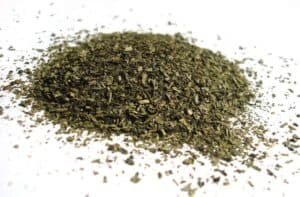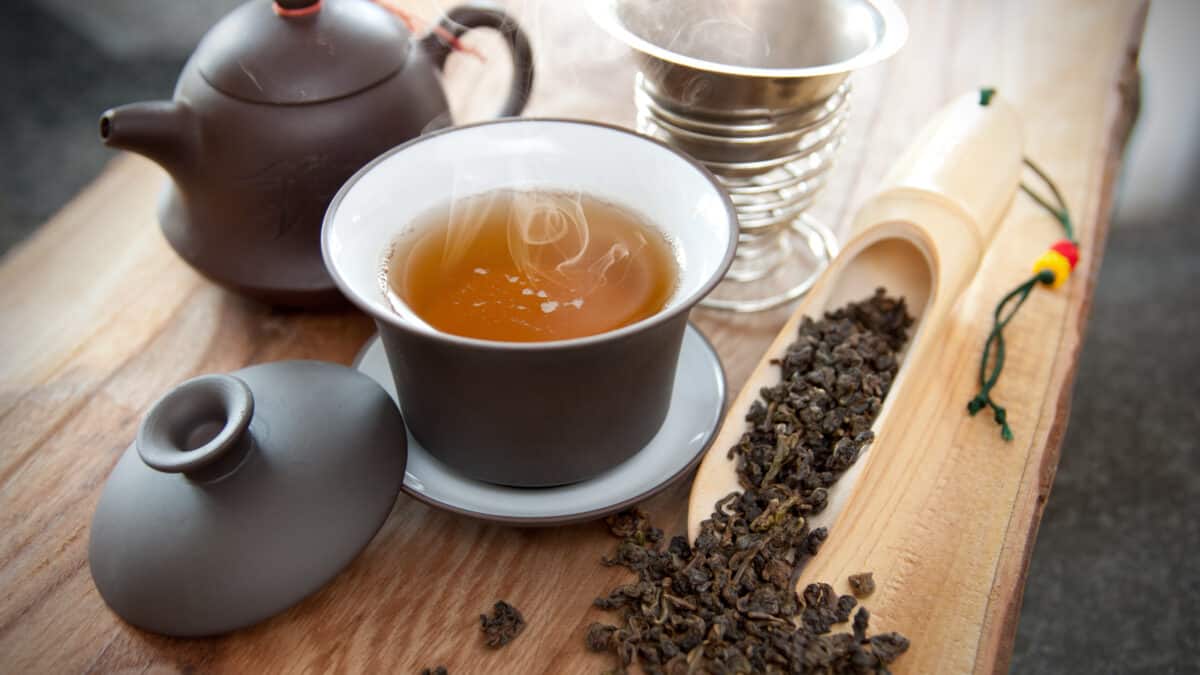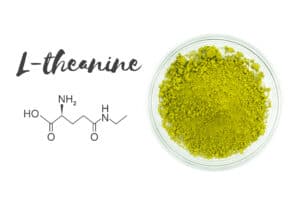Share this post
The calming properties of L-theanine
Each year the American Psychological Association conducts a survey of stress among Americans. According to their March 2022 report, “The number of people who say they’re significantly stressed… is stunning relative to what we’ve seen since we began the survey in 2007.”[1]
Stress and anxiety are inter-related, and they have substantial impacts on human health. Persistent stress contributes to hypertension, heart disease, irritable bowel syndrome (IBS), eating disorders, substance abuse, and neurodegenerative diseases.[2],[3],[4] It’s no surprise that people are seeking ways to alleviate stress and improve their quality of life.
Thankfully, L-theanine – an amino acid derived from the tea plant (Camellia sinensis) – is a natural product that may help.[5]
The medicinal properties of tea have been celebrated as far back as 2737 BCE.[6],[7] According to Chinese scholars, “Drinking tea can allow people to acquire a peaceful, relaxed, refreshed and cheerful enjoyment, and even longevity.”[8]

Modern science confirms the value of tea
Modern science confirms this point of view. A placebo-controlled study published in 2007, for example, showed that six weeks of tea consumption helped people to recover more quickly from a stressful task, leading to lower post-stress cortisol levels and greater relaxation.[9]
Of course, the rituals that surround tea drinking contribute to a sense of calm – but so do the bioactive ingredients found within the tea leaves themselves. The relaxing effect is mainly due to L-theanine (N-ethyl-L-glutamine). This natural amino acid is found in Camellia sinensis, the evergreen shrub that is used to produce black, green, and oolong teas.[10],[11],[12]
L-theanine’s chemical structure is similar to glutamate, the primary excitatory neurotransmitter in the central nervous system.[13] Glutamate plays a key role in stress responses via the hypothalamic-pituitary-adrenal (HPA) axis. Theanine decreases cortisol levels by inhibiting this response.[14],[15],[16]
L-theanine also increases gamma aminobutyric acid (GABA)-A, the principal inhibitory neurotransmitter in the human brain.[17] The combination of these effects produces a sense of equanimity in the face of stress.[18],[19]
Theanine counteracts the effects of stress
Stress stimulates the nervous system to produce large amounts of vasoconstricting hormones that increase blood pressure. Fortunately, L-theanine can reduce heart rate and blood pressure during stressful events and mentally challenging tasks, especially in those who are prone to anxiety.[20],[21],[22]
L-theanine can reduce heart rate and blood pressure during stressful events and mentally challenging tasks.
In one study, human volunteers were asked to perform a challenging mental task, and L-theanine helped lower blood pressure and tension-anxiety scores in those whose blood pressure increased during the task.[22]
Similar anti-anxiety effects have been seen in many animal and human studies.[13],[14],[20],[22] In another study in which volunteers were asked to complete a challenging mental test, a dose of 200 mg L-theanine reduced heart rate, subjective stress scores, and salivary immunoglobulin A (IgA) levels (an objective marker of stress).[20]
Similarly, in students training for pharmacy practice, supplemental L-theanine reduced subjective stress levels.[23] Theanine also lowered salivary α-amylase activity, a marker of sympathetic nervous system activity and the “fight or flight” response.
Human electroencephalograph (EEG) studies have shown that alpha brain waves are generated within 40 minutes after the oral administration of theanine (50-200 mg).[11],[12],[22] Alpha brain-wave activity is indicative of relaxation, as well as increased creativity, better performance under stress, and improved learning and concentration.[24],[25] (For comparison, 200 mg of theanine is equivalent to about eight cups of black tea, so it takes a lot of tea to equal the effects of one L-theanine capsule.)[26]
Theanine sharpens the mind
Tea contains caffeine and L-theanine, in a ratio of 2:1 to 4:1, depending on the type of tea and its method of preparation.[24],[27] Although moderate doses of caffeine can sharpen the mind, the presence of caffeine counteracts the relaxing effect of L-theanine.[28]
Remarkably, a single 200 mg dose of L-theanine can increase our ability to concentrate, albeit by a different mechanism than caffeine – and one that does not raise blood pressure.[29]
Multiple clinical trials have confirmed that L-theanine sharpens human attention.[10],[22],[30],[31],[32] (Attention is defined as the concentration of awareness on certain phenomena to the exclusion of other stimuli.)
L-theanine allows individuals to focus their attention more efficiently on their goals, without getting distracted.
Electrophysiological recordings in humans confirm that theanine has a specific effect on the brain’s attention circuitry, enabling the brain to sustain attention throughout difficult or tedious tasks.[33],[34],[35] The net result is that L-theanine allows individuals to focus their attention more efficiently on their goals, without getting distracted.[32]
Dr. Andrew Scholey, Professor of Human Psychopharmacology at Monash and Swinburne Universities (Melbourne, Australia), believes that this meditative state is achieved by L-theanine’s ability to relax only the areas of the brain that are not needed to perform the task at hand.[36] “The upshot of L-theanine’s effects is a relaxed, capable state of mind – you are in the zone,” says Scholey.[36]
In a study of generally healthy adults, consistent L-theanine administration (200 mg/day for four weeks) increased verbal fluency and decision-making functions, while improving overall mood.[37] Theanine’s ability to boost mood is due in part to an increase in the neurotransmitter dopamine.[16],[18],[38]
Theanine supports and protects the brain
Multiple lines of investigation suggest that drinking tea (and/or consuming L-theanine) may protect the brain against chronic stress, aging, and cognitive decline.[5],[31],[39],[40],[41],[42],[43],[44]
Among other effects, L-theanine turns on genes that promote the regeneration of brain neurons.[45],[46],[47] L-theanine also boosts the expression of brain-derived neurotrophic factor (BDNF), a protein that enhances learning and memory.[26],[48],[49] Therefore, theanine has the potential to reduce the risk of Alzheimer’s disease and other neurodegenerative conditions.” [5],[46]
L-theanine turns on genes that promote the regeneration of brain neurons.
Consistent with these findings, a double-blind, placebo-controlled trial showed that a combination of green tea extract (GTE) and L-theanine significantly improved memory in adults (with an average age of 58) with mild cognitive impairments.[50] In this study, the participants took two supplement capsules twice daily for 16 weeks, with each capsule providing 360 mg GTE and 60 mg L-theanine.[50]
L-theanine also slows the progression of Parkinson’s disease in animal models.[51],[52],[53] According to a recent review, “This unique amino acid bears a potential to ameliorate the pathophysiological changes associated with Parkinson’s disease as it displays antioxidant and anti-inflammatory properties, improves motor behavioral abnormalities, increases dopamine availability, and may cause a favorable downshift in neurodegeneration due to glutamate excitotoxicity.”[54]
In conclusion, L-theanine is a popular supplement that is used to facilitate relaxation, improve mood, counteract stress, and actively support brain health and cognition. If stress is impacting your quality of life, you may want to give L-theanine a whirl.
If you enjoyed this article, you may also be interested in the following posts:
- How to Reduce Stress and How it Affects Our Health
- Calming Cortisol with Botanicals
- Stress and Psychological Resilience
- Sleep and Relaxation Support – Stat!
References
Click here to see References[1] American Psychological Association. Inflation, war push stress to alarming levels at two-year COVID-19 anniversary [Internet]. Washington (DC): APA; 2022 [cited 2022 Apr 30]. Available from: https://www.apa.org/news/press/releases/2022/03/inflation-war-stress
[2] Mayo Clinic Staff. Stress symptoms: effects on your body and behavior [Internet]. Rochester (MN): Mayo Clinic; 2021 [cited 2022 Apr 30]. Available from: https://www.mayoclinic.org/healthy-lifestyle/stress-management/in-depth/stress-symptoms/art-20050987
[3] Salleh MR. Life event, stress and illness. Malays J Med Sci. 2008 Oct;15(4):9-18.
[4] Santosa A, et al. Psychosocial risk factors and cardiovascular disease and death in a population-based cohort from 21 low-, middle-, and high-income countries. JAMA Netw Open. 2021 Dec 1;4(12):e2138920.
[5] Wang Q, et al. L-theanine as a promising agent on brain health-promoting foods–a review. J Food Bioactives. 2021 Mar 31;13.
[6] Tea Association of the USA Inc. Tea Fact Sheet – 2022 [Internet]. New York (NY): Tea Association; 2022 [cited 2022 Apr 30]. Available from: https://www.teausa.com/teausa/images/Tea_Fact_2021.pdf
[7] Liu Y. Analysis of the effective ingredients in tea. In: 7th International Conference on Humanities and Social Science Research (ICHSSR 2021). 2021 May 20:696-9. Atlantis Press.
[8] Pan SY, et al. Tea and tea drinking: China’s outstanding contributions to the mankind. Chin Med. 2022 Feb 22;17(1):27.
[9] Steptoe A, et al. The effects of tea on psychophysiological stress responsivity and post-stress recovery: a randomised double-blind trial. Psychopharmacology (Berl). 2007 Jan;190(1):81-9.
[10] De Bruin EA, et al. Black tea improves attention and self-reported alertness. Appetite. 2011 Apr;56(2):235-40.
[11] Juneja LR, et al. L-theanine—a unique amino acid of green tea and its relaxation effect in humans. Trends Food Sci Technol. 1999 Jun 1;10(6-7):199-204.
[12] Nobre AC, et al. L-theanine, a natural constituent in tea, and its effect on mental state. Asia Pac J Clin Nutr. 2008;17 Suppl 1:167-8.
[13] Nathan PJ, et al. The neuropharmacology of L-theanine (N-ethyl-L-glutamine): a possible neuroprotective and cognitive enhancing agent. J Herb Pharmacother. 2006;6(2):21-30.
[14] Wang L, et al. How does the tea L-theanine buffer stress and anxiety. Food Sci Hum Wellness. 2022 May 1;11(3):467-75.
[15] Unno K, et al. Ingestion of theanine, an amino acid in tea, suppresses psychosocial stress in mice. Exp Physiol. 2013 Jan;98(1):290-303.
[16] Rothenberg DO, Zhang L. Mechanisms underlying the anti-depressive effects of regular tea consumption. Nutrients. 2019 Jun 17;11(6):1361.
[17] Egashira N, et al. Involvement of GABA(A) receptors in the neuroprotective effect of theanine on focal cerebral ischemia in mice. J Pharmacol Sci. 2007 Oct;105(2):211-4.
[18] Yamada T, et al. Effects of theanine, r-glutamylethylamide, on neurotransmitter release and its relationship with glutamic acid neurotransmission. Nutr Neurosci. 2005 Aug;8(4):219-26.
[19] Ogawa S, et al. Effects of L-theanine on anxiety-like behavior, cerebrospinal fluid amino acid profile, and hippocampal activity in Wistar Kyoto rats. Psychopharmacology (Berl). 2018 Jan;235(1):37-45.
[20] Kimura K, et al. L-theanine reduces psychological and physiological stress responses. Biol Psychol. 2007 Jan;74(1):39-45.
[21] Yoto A, et al. Effects of L-theanine or caffeine intake on changes in blood pressure under physical and psychological stresses. J Physiol Anthropol. 2012 Oct 29;31(1):28.
[22] Higashimaya A, Htay HH, et al. Effects of L-theanine on attention and reaction time response. J Funct Foods. 2011 Jul 1;3(3):171-8.
[23] Unno K, et al. Anti-stress effect of theanine on students during pharmacy practice: positive correlation among salivary α-amylase activity, trait anxiety and subjective stress. Pharmacol Biochem Behav. 2013 Oct;111:128-35.
[24] Stevens Jr CE, Zabelina DL. Creativity comes in waves: an EEG-focused exploration of the creative brain. Curr Opin Behav Sci. 2019 Jun 1;27:154-62.
[25] Lardner AL. Neurobiological effects of the green tea constituent theanine and its potential role in the treatment of psychiatric and neurodegenerative disorders. Nutr Neurosci. 2014 Jul;17(4):145-55.
[26] Keenan EK, et al. How much theanine in a cup of tea? Effects of tea type and method of preparation. Food Chem. 2011 Mar 15;125(2):588-94.
[27] Camfield DA, et al. Acute effects of tea constituents L-theanine, caffeine, and epigallocatechin gallate on cognitive function and mood: a systematic review and meta-analysis. Nutr Rev. 2014;72(8):507-22.
[28] Boros K, et al. Theanine and caffeine content of infusions prepared from commercial tea samples. Pharmacogn Mag. Jan-Mar 2016;12(45):75-9.
[29] Kahathuduwa CN, et al. Acute effects of theanine, caffeine and theanine-caffeine combination on attention. Nutr Neurosci. 2017 Jul;20(6):369-77.
[30] Dassanayake TL, et al. L-theanine improves neurophysiological measures of attention in a dose-dependent manner: a double-blind, placebo-controlled, crossover study. Nutr Neurosci. 2022 Apr;25(4):698-708.
[31] Baba Y, et al. Effects of L-theanine on cognitive function in middle-aged and older subjects: a randomized placebo-controlled study. J Med Food. 2021 Apr;24(4):333-41.
[32] Kahathuduwa CN, et al. L-Theanine and caffeine improve target-specific attention to visual stimuli by decreasing mind wandering: a human functional magnetic resonance imaging study. Nutr Res. 2018 Jan;49:67-78.
[33] Gomez-Ramirez M, et al. The deployment of intersensory selective attention: a high-density electrical mapping study of the effects of theanine. Clin Neuropharmacol. Jan-Feb 2007;30(1):25-38.
[34] Gomez-Ramirez M, et al. The effects of L-theanine on alpha-band oscillatory brain activity during a visuo-spatial attention task. Brain Topogr. 2009 Jun;22(1):44-51.
[35] White DJ, et al. Anti-stress, behavioural and magnetoencephalography effects of an L-theanine-based nutrient drink: a randomised, double-blind, placebo-controlled, crossover trial. Nutrients. 2016 Jan 19;8(1):53.
[36] Gilbert N. Drink tea and be merry. Nature. 2019 Feb 7;566:S8-9.
[37] Hidese S, et al. Effects of L-theanine administration on stress-related symptoms and cognitive functions in healthy adults: a randomized controlled trial. Nutrients. 2019 Oct 3;11(10):2362.
[38] Yokogoshi H, et al. Effect of theanine, r-glutamylethylamide, on brain monoamines and striatal dopamine release in conscious rats. Neurochem Res. 1998;23(5):667-73.
[39] Kakuda T. Neuroprotective effects of theanine and its preventive effects on cognitive dysfunction. Pharmacol Res. 2011 Aug;64(2):162-8.
[40] Unno K, et al. Theanine, the main amino acid in tea, prevents stress-induced brain atrophy by modifying early stress responses. Nutrients. 2020 Jan 8;12(1):174.
[41] Tomata Y, et al. Green tea consumption and the risk of incident dementia in elderly Japanese: the Ohsaki Cohort 2006 Study. Am J Geriatr Psychiatry. 2016 Oct 1;24(10):881-9.
[42] Hu G, et al. Coffee and tea consumption and the risk of Parkinson’s disease. Mov Disord. 2007 Nov 15;22(15):2242-8.
[43] Ye H, et al. Dynamic observation of the effect of l-theanine on cerebral ischemia-reperfusion injury using magnetic resonance imaging under mathematical model analysis. J Healthc Eng. 2021 Oct 26;2021:5679665.
[44] Zhu G, et al. Synaptic modification by L-theanine, a natural constituent in green tea, rescues the impairment of hippocampal long-term potentiation and memory in AD mice. Neuropharmacology. 2018 Aug;138:331-40.
[45] Takarada T, et al. Upregulation of Slc38a1 gene along with promotion of neurosphere growth and subsequent neuronal specification in undifferentiated neural progenitor cells exposed to theanine. Neurochem Res. 2016 Feb;41(1-2):5-15.
[46] Yoneda Y, et al. The role of glutamine in neurogenesis promoted by the green tea amino acid theanine in neural progenitor cells for brain health. Neurochem Int. 2019 Oct;129:104505.
[47] Yoneda Y, et al. Selective upregulation by theanine of Slc38a1 expression in neural stem cell for brain wellness. Molecules. 2020 Jan 15;25(2):347.
[48] Wakabayashi C, et al. Behavioral and molecular evidence for psychotropic effects in L-theanine. Psychopharmacology (Berl). 2012;219(4):1099-109.
[49] Miodownik C, et al. Serum levels of brain-derived neurotrophic factor and cortisol to sulfate of dehydroepiandrosterone molar ratio associated with clinical response to L-theanine as augmentation of antipsychotic therapy in schizophrenia and schizoaffective disorder patients. Clin Neuropharmacol. Jul-Aug 2011;34(4):155-60.
[50] Park SK, et al. A combination of green tea extract and l-theanine improves memory and attention in subjects with mild cognitive impairment: a double-blind placebo-controlled study. J Med Food. 2011 Apr;14(4):334-43.
[51] Shen J. L-theanine: neuroprotective against trichloroethylene-induced Parkinsons disease hallmarks. J Toxicol Environ Health Sci. 2020 Aug 31;12(3):36-45.
[52] Raj K, et al. L-Theanine ameliorates motor deficit, mitochondrial dysfunction, and neurodegeneration against chronic tramadol induced rat model of Parkinson’s disease. Drug Chem Toxicol. 2021 Jul 1;1-12.
[53] Chen CN, et al. L-theanine ameliorated rotenone-induced Parkinsonism-like symptoms in rats. Neurotox Res. 2022 Feb;40(1):241-58.
[54] Deb S, et al. Neuroprotective attributes of L-theanine, a bioactive amino acid of tea, and its potential role in Parkinson’s disease therapeutics. Neurochem Int. 2019 Oct;129:104478.
The information provided is for educational purposes only. Consult your physician or healthcare provider if you have specific questions before instituting any changes in your daily lifestyle including changes in diet, exercise, and supplement use.
Share this post
Theanine for Stress Support
Marina MacDonald, MS, PhD
Related posts
Hemicellulose – A Natural Immune Enhancer?
Plant and Mushroom Blend Provides Gut and Immune Support Hemicellulose isn’t a new thing. In fact, it is as timeless as the plants and fungi that cover the face of our planet. Within plants, much like cellulose, hemicellulose is structural in function. It differs from cellulose in that it is a polysaccharide comprised of…
Niacin for Alcoholism
What vitamin B3 has to do with addiction Taking a vitamin B3 (niacin) supplement may help treat alcohol use disorder and ease the symptoms of alcohol withdrawal. Alcohol use disorder (AUD, or alcoholism) is a medical condition in which it is very difficult to control one’s alcohol use – even in the face of…
Lactobacillus plantarum DR7: A Probiotic For Stress Relief
When I was a young athlete, I would get sick to my stomach before every big game, race, or match. The stress I felt always manifested in my gut. Many people experience feelings of a “nervous stomach” because our brain and our gut are so intricately intertwined. Sayings like “trust your gut”, “feel it…
Easing Pain, Naturally
Drug-free, natural remedies for pain Just about nobody likes to be in pain. That may be why there are so many drugs out there nowadays that effectively treat it, and why we so consistently seek them out. While synthetic analgesics like opioids, NSAIDs, and acetaminophen can be effective in quieting pain, these drugs also…
Mastic Gum for Oral Health and More
The things we know now about this gum that the Greeks have seen in practice for over 2,500 years Ancient lore and cutting-edge science often converge in the arena of natural plant-based medicine. There is perhaps no better example of this than mastic gum, an aromatic, white resin derived from the Pistacia lentiscus tree….
Seaweed for Immunity
Complex seaweed-derived compounds known as fucoidans support immune function and longevity Picture a frozen earth 635 million years ago, the planet at last beginning to thaw from an extraordinary ice age that blanketed land and sea. As the permafrost softens and melts, new life emerges from the ocean depths: sea plants.[1] The earth’s first…
Categories
- Botanicals (56)
- GI Health (53)
- Healthy Aging (121)
- Immune Support (39)
- In The News (39)
- Kids Health (21)
- Stress and Relaxation (50)
- Uncategorized (1)
- Video (9)
- Vitamins & Minerals (51)





